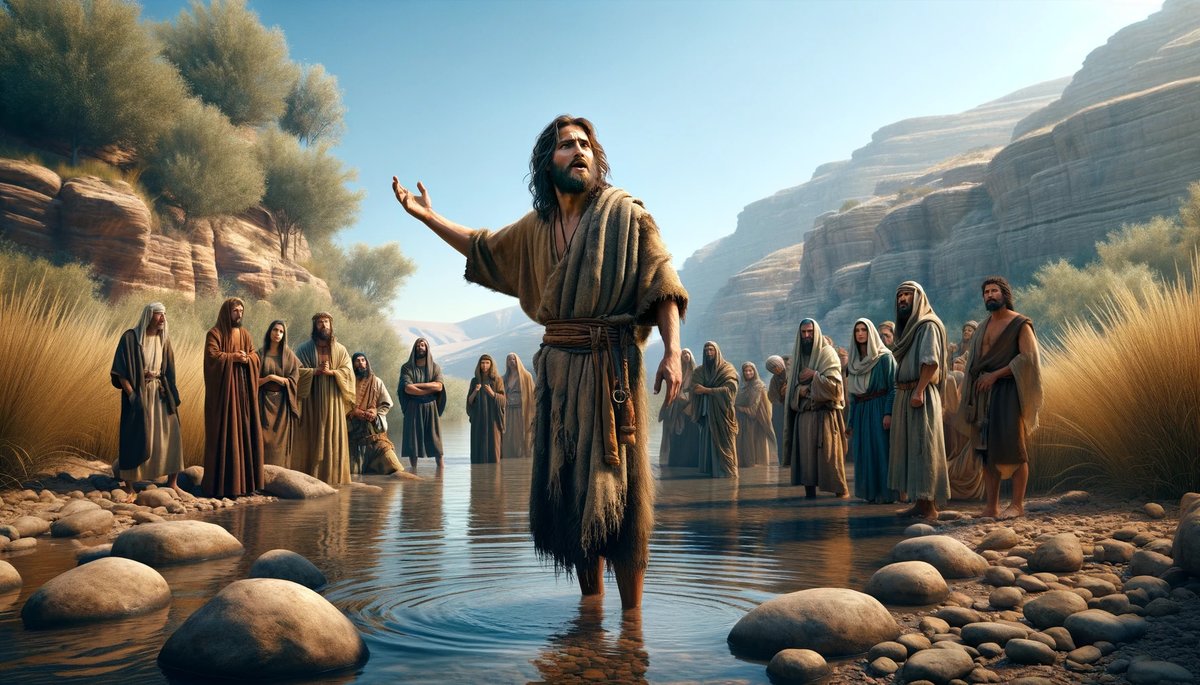Home>Christian Videos>Bible Stories>When Did Jesus And John The Baptist Meet


Bible Stories
When Did Jesus And John The Baptist Meet
Published: March 6, 2024
Jason DeRose, Managing Editor at Christian.net, uses his expertise in religion and journalism to deepen understanding of faith's societal impacts. His editorial leadership, coupled with a strong academic background, enriches the platform’s diverse content, earning him recognition in both journalism and religious circles.
Discover the encounter between Jesus and John the Baptist in this insightful exploration of Bible stories. Learn about their meeting and its significance. Explore more Bible stories now!
(Many of the links in this article redirect to a specific reviewed product. Your purchase of these products through affiliate links helps to generate commission for Christian.net, at no extra cost. Learn more)
Table of Contents
Introduction
When did Jesus and John the Baptist meet? This question has intrigued scholars and believers for centuries. The meeting of these two pivotal figures in Christianity holds significant importance in the narrative of the New Testament. Exploring the historical and religious context surrounding their encounter provides valuable insights into the early stages of Jesus' ministry and the impact of John the Baptist's teachings. Delving into the events leading up to their meeting sheds light on the interconnectedness of their roles in shaping the foundation of Christian faith.
Read more: When Did John The Baptist And Jesus Meet
The Birth of John the Baptist
The birth of John the Baptist is a remarkable event in the New Testament, as it is intricately linked to the arrival of Jesus Christ. According to the Gospel of Luke, John's parents, Zechariah and Elizabeth, were devout and righteous individuals, yet they were childless. One day, while Zechariah was serving as a priest in the temple, the angel Gabriel appeared to him and announced that Elizabeth would conceive a son, who would be named John. This miraculous proclamation came as a surprise to Zechariah, who questioned the angel due to his and Elizabeth's old age. As a consequence of his disbelief, Zechariah was struck mute until the day of John's birth.
The birth of John the Baptist was a testament to the fulfillment of divine prophecy and the unfolding of God's plan for the salvation of humanity. It signified the breaking of a long period of silence from God, as no prophets had arisen in Israel for centuries. John's birth was a precursor to the arrival of Jesus, and his role as the forerunner of the Messiah was foretold in the Old Testament book of Isaiah. The miraculous nature of John's conception and birth set the stage for his extraordinary destiny as the herald of the coming Christ, preparing the way for the transformative ministry of Jesus.
The birth of John the Baptist serves as a pivotal moment in the narrative of Christianity, marking the beginning of a new era in the divine unfolding of salvation history. It symbolizes the divine intervention in the lives of ordinary individuals, demonstrating God's faithfulness to fulfill His promises. John's birth not only brought joy to his parents but also carried profound implications for the spiritual landscape of the world. This significant event laid the groundwork for the eventual meeting of John the Baptist and Jesus, which would have a profound impact on the course of Christian history.
The Early Life of Jesus
The early life of Jesus, as depicted in the New Testament, is shrouded in mystery and intrigue. The Gospels of Matthew and Luke provide glimpses into his infancy and childhood, highlighting key events such as his birth in Bethlehem, the visit of the Magi, and the flight to Egypt to escape King Herod's wrath. These accounts emphasize the divine nature of Jesus' birth, portraying him as the long-awaited Messiah prophesied in the Hebrew Scriptures. Despite the limited information about his formative years, the narratives surrounding Jesus' early life lay the foundation for his later ministry and the profound impact he would have on the world.
The infancy narratives in the Gospels serve to establish Jesus' royal lineage and his fulfillment of ancient prophecies, positioning him as the rightful heir to the Davidic throne. The visit of the Magi, guided by a star to honor the newborn king, underscores the universal significance of Jesus' birth, foreshadowing his role as the Savior not only for the Jewish people but for all humanity. Additionally, the account of the Holy Family's flight to Egypt and subsequent return to Nazareth underscores the perilous circumstances surrounding Jesus' early years and the divine protection that shielded him from harm.
The early life of Jesus is also marked by the episode of his visit to the temple in Jerusalem at the age of twelve, where he engages the teachers in profound discussions, demonstrating wisdom beyond his years. This incident offers a rare glimpse into Jesus' intellectual and spiritual development, hinting at the extraordinary destiny that awaited him. While the Gospels provide only a few details about Jesus' childhood, these accounts serve to emphasize his unique identity as the Son of God and the embodiment of divine purpose.
The early life of Jesus sets the stage for his eventual encounter with John the Baptist and the commencement of his public ministry. The events surrounding his birth and upbringing lay the groundwork for the profound teachings, miracles, and sacrificial mission that would define his adult life. The mysterious and awe-inspiring nature of Jesus' early years contributes to the enigmatic aura that surrounds his persona, captivating the imagination of believers and non-believers alike.
John the Baptist's Ministry
John the Baptist's ministry was characterized by a fervent call to repentance and spiritual renewal, as he preached in the wilderness of Judea, proclaiming a message of preparation for the imminent arrival of the Messiah. His ascetic lifestyle, clad in camel's hair with a leather belt around his waist, and his diet of locusts and wild honey, reflected his commitment to a life of simplicity and devotion to his divine calling. Multitudes from Jerusalem, Judea, and the region along the Jordan flocked to John to confess their sins and be baptized by him in the waters of the Jordan River, symbolizing their desire for spiritual cleansing and readiness for the coming kingdom of God.
John's ministry was marked by uncompromising boldness and prophetic fervor, as he fearlessly confronted the religious authorities and challenged the moral complacency of the people. He denounced the Pharisees and Sadducees, labeling them as a "brood of vipers" and admonishing them to produce fruits consistent with genuine repentance. His fiery exhortations and unyielding commitment to righteousness earned him a reputation as a powerful and uncompromising preacher, drawing attention to his pivotal role as the herald of the Messiah.
Central to John's ministry was his proclamation of the imminent arrival of the long-awaited Messiah, whose sandals he considered himself unworthy to untie. He declared, "I baptize you with water for repentance. But after me comes one who is more powerful than I, whose sandals I am not worthy to carry. He will baptize you with the Holy Spirit and fire." This prophetic announcement underscored John's recognition of his subordinate role in relation to the Messiah and his unwavering commitment to preparing the hearts of the people for the transformative ministry of Jesus.
John the Baptist's ministry serves as a powerful example of prophetic courage and unwavering dedication to the divine mission entrusted to him. His bold proclamation of repentance and his role as the forerunner of Christ laid the groundwork for the momentous encounter between Jesus and John, which would mark a pivotal turning point in the unfolding of God's redemptive plan for humanity.
Jesus' Baptism by John
The baptism of Jesus by John the Baptist is a profound and pivotal event in the New Testament, symbolizing the initiation of Jesus' public ministry and the affirmation of his divine identity. According to the Gospels, Jesus traveled from Galilee to the Jordan River to be baptized by John, who initially hesitated, feeling unworthy to baptize the one whom he recognized as the greater figure. However, Jesus insisted, stating that it was necessary to fulfill all righteousness. As Jesus emerged from the waters of the Jordan, the heavens opened, and the Spirit of God descended like a dove, alighting upon him. A voice from heaven proclaimed, "This is my Son, whom I love; with him I am well pleased."
The baptism of Jesus holds profound theological significance, as it serves as a public declaration of his identity as the beloved Son of God and the commencement of his redemptive mission. The descent of the Holy Spirit upon Jesus affirmed his anointing for the ministry that lay ahead, empowering him for the challenges and triumphs that awaited him. The voice from heaven, affirming Jesus as the beloved Son in whom God is well pleased, underscored the divine approval and affirmation of Jesus' mission to bring salvation to humanity.
Jesus' baptism by John also exemplifies his solidarity with humanity, as he willingly participated in a ritual of repentance and cleansing, despite being sinless. His act of identifying with the people he came to save foreshadowed his ultimate sacrifice on the cross, where he would bear the sins of the world and offer redemption to all who believe in him. The baptism of Jesus serves as a powerful demonstration of his humility, obedience to the will of God, and his role as the ultimate fulfillment of God's redemptive plan.
The baptism of Jesus by John the Baptist marks a significant turning point in the narrative of the New Testament, signifying the commencement of Jesus' public ministry and the revelation of his divine identity. This transformative event set the stage for the subsequent teachings, miracles, and redemptive work of Jesus, culminating in his sacrificial death and triumphant resurrection. The baptism of Jesus by John stands as a profound testament to the unity of the Father, Son, and Holy Spirit, and the inauguration of the new covenant that would bring hope and salvation to all who believe.
Read more: When Did John The Baptist Live
The Meeting of Jesus and John the Baptist
The meeting of Jesus and John the Baptist represents a pivotal moment in the narrative of the New Testament, signifying the convergence of two extraordinary destinies and the fulfillment of divine prophecy. According to the Gospel accounts, Jesus came from Galilee to the Jordan River, where John was baptizing multitudes and preaching a message of repentance. As Jesus approached John, the latter recognized him and declared, "Behold, the Lamb of God, who takes away the sin of the world!" This profound acknowledgment underscored John's awareness of Jesus' divine identity and his role as the ultimate sacrifice for the redemption of humanity.
The meeting of Jesus and John the Baptist holds profound theological significance, as it marks the passing of the baton from the herald to the long-awaited Messiah. John, in his humility and recognition of Jesus' preeminence, expressed his unworthiness to even untie the sandals of the one who was to come after him. This act of deference and reverence highlighted John's pivotal role in preparing the hearts of the people for the transformative ministry of Jesus. The meeting between these two figures served as a powerful affirmation of Jesus' identity as the fulfillment of ancient prophecies and the embodiment of God's redemptive plan for humanity.
The encounter between Jesus and John the Baptist also serves as a profound demonstration of humility and mutual respect. Despite his divine status, Jesus sought baptism from John, identifying with the human need for repentance and spiritual renewal. This act of solidarity with humanity underscored Jesus' compassion and his willingness to partake in the human experience, setting an example for his followers to emulate. The meeting of Jesus and John the Baptist thus exemplifies the unity of purpose between the forerunner and the Messiah, as they collaborated in the divine drama of salvation.
The meeting of Jesus and John the Baptist marked the commencement of Jesus' public ministry, as he emerged from the waters of the Jordan, anointed by the Holy Spirit and affirmed by the voice from heaven. This transformative encounter set the stage for the subsequent teachings, miracles, and redemptive work of Jesus, as he embarked on his mission to proclaim the kingdom of God and offer salvation to all who would believe. The meeting of Jesus and John the Baptist stands as a testament to the interconnectedness of their roles in the divine narrative, weaving together the threads of prophecy, fulfillment, and the unfolding of God's redemptive plan for humanity.
Conclusion
The meeting of Jesus and John the Baptist stands as a pivotal moment in the narrative of the New Testament, symbolizing the convergence of two extraordinary destinies and the fulfillment of divine prophecy. Their encounter marked the passing of the baton from the herald to the long-awaited Messiah, affirming Jesus' identity as the fulfillment of ancient prophecies and the embodiment of God's redemptive plan for humanity. The baptism of Jesus by John served as a public declaration of his divine identity and the commencement of his redemptive mission, setting the stage for the subsequent teachings, miracles, and sacrificial mission that would define his adult life. The interconnectedness of their roles in shaping the foundation of Christian faith underscores the profound significance of their meeting, weaving together the threads of prophecy, fulfillment, and the unfolding of God's redemptive plan for humanity.














